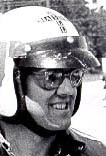 Bill Baird was a leading AMA National Enduro rider from the mid-1950s to the late 1960s. Baird won seven consecutive national enduro championships during the ‘60s. In addition to being a top competitor, Baird was also a key figure in the AMA, serving on the Board of Trustees for 21 years and being one of the driving forces behind the formation of the Motorcycle Hall of Fame Museum through his activities for the American Motorcycle Heritage Foundation. Baird is also an avid motorcycle collector. Several of his machines have been displayed at the Motorcycle Hall of Fame Museum.
Bill Baird was a leading AMA National Enduro rider from the mid-1950s to the late 1960s. Baird won seven consecutive national enduro championships during the ‘60s. In addition to being a top competitor, Baird was also a key figure in the AMA, serving on the Board of Trustees for 21 years and being one of the driving forces behind the formation of the Motorcycle Hall of Fame Museum through his activities for the American Motorcycle Heritage Foundation. Baird is also an avid motorcycle collector. Several of his machines have been displayed at the Motorcycle Hall of Fame Museum.
Baird was born near Mount Vernon, Ill., on May 5, 1929. His family moved to the northern Illinois community of Sterling when he was a teenager. Unlike many successful racers, Baird didn’t take up motorcycling at an early age. He bought his first bike, a Triumph Tiger, when he was 19. He rode on the street, but didn’t do much in the way of off-road riding in the early years.
By the mid-‘50s, Baird began to ride in local enduro events in Northern Illinois. In 1955, he entered Michigan’s famous Jack Pine Enduro for the first time.
"I was a member of Rock River Rider Motorcycle Club and a lot of the members were involved in enduro racing, so I just decided to try it out," Baird recalled. "The main thing then was the camaraderie we all enjoyed. We worked together in laying out courses, and it was just a nice group and family activity to be a part of."
By 1956, Baird was getting more serious about his racing. He went from the Triumph Tiger to a Triumph TR6 650cc twin off-road machine. He also began winning on the local level and gained a lot of experience. In 1961, Baird won his first major national enduro race, the 175-mile event held in Wausau, Wisconsin.
In 1962 Baird competed in the newly formed AMA Grand National Enduro Championship on a new 500cc Triumph Trophy. He edged out Michigan rider Bert Wieland by four points to win the first championship series. He won the title with consistent top finishes, something Baird would become known for.
Baird defended his national enduro title in 1963, and again the next year and the next, all the way through to seven straight national titles through 1968. Through the first six years of the Grand National Enduro Championships, Baird racked up a total of 10 national enduro victories. He brought that total to 14 after a dream season in 1968.
In 1968, Baird had one of the most memorable seasons in the history of the enduro series. He won four nationals, including the prestigious Jack Pine. An individual victory at that race had eluded him since he first competed in the event 13 years earlier.
"After winning the Jack Pine, I really felt like I had accomplished just about everything I’d wanted in enduro racing," Baird said. "That overall win at the Jack Pine meant so much, since I’d come so close to winning there several times before. I ended up winning more trophies from the Jack Pine than years I competed there. I was a part of team victories and top rider of the day and some others things they gave trophies for then."
Having accomplished his goals in racing, Baird semi-retired from the sport after his championship-winning 1968 season. He continued to race at a few nationals in 1969, before retiring from the series. The one thing Baird did not miss was competing in the enduro events held on the West Coast. Being a family man with three children, Baird never could quite justify the expense of traveling to the few enduros in California.
After his racing days, Baird continued to be active in motorcycling, serving as an AMA trustee beginning in 1973. He also continued to be active in his local club and served as treasurer for the Blackhawk Chapter of the Antique Motorcycle Club of America. He served as secretary for the Midwest National Enduro Riders Association for over 30 years.
In 1987, Baird retired from his lifelong machinist trade. He and wife Millie had three children. His son, Bill, Jr., was an excellent enduro rider, as well.
Baird suffered a life-threatening illness in late in 1999, but came through with a strong recovery. When inducted, he continued to remain active in the motorcycling community. He also maintained a growing private collection of motorcycles, which number close to 40 bikes.
Bill Baird passed away July 12, 2017.